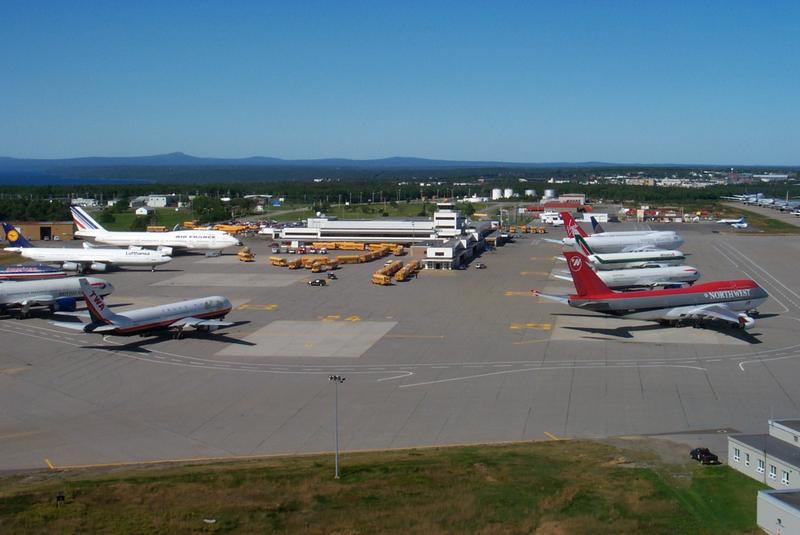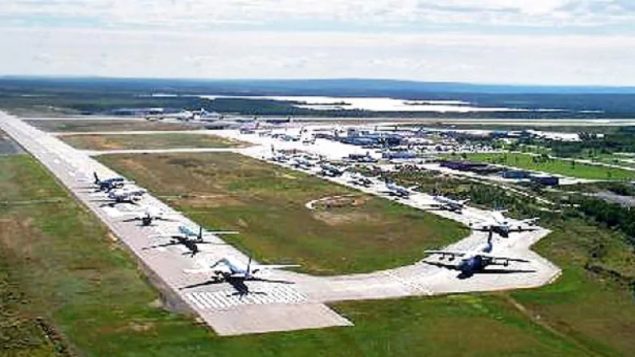When the sky fell on 9/11, this Canadian town saved the day
Erez Linn
Israel Hayom
September 11, 2021
On September 11, 2001, When the US authorities realized that planes had been hijacked and crashing into buildings, they closed America's airspace.
This meant that the closest alternative airport for many US-bound passenger planes was in a tiny town in eastern Canada, Gander, in the province of Newfoundland and Labrador. The town is often called "the lightbulb of the Atlantic" because of its important lighthouse-like role in air travel. Without their checked luggage and without any idea how long they would stay and at what cost, thousands of stunned passengers disembarked from 38 aircraft that landed one after another in Gander, essentially doubling the town's population.


Some of what quickly became 38 planes that landed at Gander on Sept. 11
"There is a nickname for the town, dates back to when the airport was initially created: Gander is the crossroads of the world. Basically, everybody transiting the North Atlantic flies over our heads every day. And the air traffic control center that is based in Gander controls all of that traffic out to midway across the Atlantic," Mayor Percy Farwell told Israel Hayom in a special interview ahead of the 20th anniversary of the tragedy.

Farwell was deputy mayor at the time and had to orchestrate a massive undertaking to take care of close to 7,000 people who had arrived on those planes and had no access to their luggage (for fear there were more terrorist plots). Farwell and practically everyone in Gander and the surrounding area stepped up to the plate and went out of their way to accommodate the passengers, buying them food, letting them into their homes, and providing for their basic communication needs by arranging everything from Kosher food to dedicated phone stations so that they could reach their loved ones and say they were safe.
Farwell and the town became synonymous with Canadian kindness and a Broadway play was even produced to celebrate their kind act of human compassion that made Gander perhaps the brightest place on earth during one of the darkest of days.
"The events of 9/11 precipitated a huge event from the 12th to the 15th in Gander, and it's because of our geographical proximity and the fact that the aircraft had to get on the ground and these people because of security reasons, they had nothing but their carry on luggage. We ended up with 6,595 people with no luggage who were perfectly healthy and extremely stressed and needing food and shelter and clothing and most importantly they needed love and compassion because it was a very stressful time for everybody and particularly for people that were being stranded in a place that they have never heard of before and wondering what all this might mean for them. We had some pretty frightened people, from 95 different countries, so you can imagine every race and religion, sexual orientation, political orientation, every dietary requirement, they all descended on our town, of less than 10, 0000 people," Farwell says, adding that he could still recall the "initial shock and disbelief of what was happening in the US."
When asked to describe his state of mind that day, Farwell says that while the town had drilled for various aviation emergencies and disasters because of its important airport, he had never thought he would have to process so many unexpected developments at the same time and a scenario in which dozens of aircraft were headed to the airport even though they might be too big for the landing strip and there was no way of knowing how long the passengers would stay and where they can be housed.
"Initially we here in little Gander, on an island in the middle of the North Atlantic, we were witnesses to it as it was unfolding and going through what I imagine were similar emotions to people around the world. When you see tragic events happening to our neighbors in the south particularly. You want to be able to do something to help and you don't quite know what that might be and often when we see tragedy, worldwide and catastrophe worldwide we send money to somebody and we hope they do something good with it and we feel a little better for having done it.
"So we were initially in that situation, and then because of the way the events unfolded and the closure of American airspace and the grounding of all aircraft in the skies at the time we, we Gander found ourselves at the center of an opportunity and an obligation to help out. And we felt we were blessed to have that opportunity because there was certainly an area that we're able to tangentially help people who were affected by these incidents.
"I think the global psyche was affected that day, the vulnerability. We just ended being as a small town for various reasons engaged in it more first hand, than normally we are able to be engaged."
Q: So it's safe to say that this has never happened before on such a scale in your town?
"Gander, is uniquely positioned in terms of travel between North America and Europe, we are on great circle routes from the major population centers in North America to the major population centers in Europe and beyond. There is a nickname for the town, dates back to when the airport was initially created: Gander is the crossroads of the world. Basically, everybody transiting the North Atlantic flies over our head every day.
"If you are headed westbound and you run into any trouble, the first opportunity you have for safe haven is Gander, that's why the airport is there. that's why the town is here.
"The airport predates the town. The airport was built here when the Canadian and US governments, we weren't even part of Canada at the time, the Canadian and US governments were seeking a place to establish an airfield to facilitate the impending air travel over the North Atlantic, it was just being developed at the time when the airport was built first and the community was built around that, shortly afterward came world war II when the airfield was a significant player and the early days of transatlantic flight when technology dictated that everyone had to land here in order to get from North America to Europe. "
Q: So how did Gander manage to handle the sheer volume of people, with thousands of guests descending from the sky?
"We hadn't really contemplated that thousands of healthy people will show up with no luggage and stay for three or four days, but the plan is to do the appropriate coordination. Ultimately, it depends on each and every citizen, supporting the effort. emptying their closets, offering people to come to their homes, for personal comfort and showers and everything else, and for food and really literally extending arms and comforting people who were very stressed. We had a lot of Americans, but we also had representatives of 95 countries here. It was like the UN, it was a very unique time in our history.
"Those days were a bit of a blur, perhaps a bit of a blur against the buffer against the real shock of what that all represented. Our people were so busy dealing with the situation at hand in our community, that we didn't really have time to fully digest what was happening until those people were finally gone."
Q: No one talks about the emotional toll on the residents, only about the passengers.
"It is a positive one, it was sort of busy. people were totally consumed, our hearts were full with the feeling you get when you know you are doing someone good when someone is in tears and you comfort them. When the people were all gone, relationships had been established and it was like losing family members. And also time to reflect on, again, more on the bigger picture. We had people here in Gander who lost loved ones in those events. One couple – I have a little thank you plaque from a couple in NY whose son was a firefighter who perished as a first responder to the events, who were here throughout all these days, and who learned the news of their son's death while they were here. There are so many stories like that. Ultimately this helped us deal with this too because we felt and our people felt less helpless. we did something tangibly, we have lasting relationships with real people who have returned. We are part of history.
"This is not unique to Gander, these are human values that were on display here. And you know, they exist everywhere. In a place like Newfoundland and Labrador you don't necessarily have to earn people's trust, you have to give them reasons to mistrust you. The way people responded here, was not out fear, they were like - whatever the reason is, we have 6,600 people here, we don't care where they are from, we don't care what color they are, we don't care what language and political ideology is, we have a lot of people here who need some help and our job on earth is to help people. Everyone's job is. It's the founding principle of almost all of the world's religions, is the golden rule. that's the founding principle of humanity really."
Q: The mayor, who is among the only two elected officials in the town who also held a city position 20 years ago, takes great pride in how his job at coordinating this undertaking managed to be all-encompassing, marshaling support from all across the province and from the private sector (and from the residents of course).
"Some people say you must have a lot of footage, but not really, we were too busy helping. There were people with old-school camcorders and the news media but a lot of these things were captured verbally.
"Technology didn't exist. That means communication – when you are stranded in a community you have never heard of, and you have loved ones, one of your primary needs is to communicate and let them know you are right. So we had the telephone company, they had within a day, an outdoor desk and tables and equipment and stuff to set up and given free international access to phones. That means communication – when you are stranded in a community you have never heard of, and you have loved ones, one of your primary needs is to communicate and let them know you are right. So we had the telephone company, they had within a day, an outdoor desk and tables and equipment and stuff to set up and given free international access to phones. So over time, everyone was able to touch base and so on. all these things there are so many different layers to it.
"One of the redeeming things from what happened in the place like Canada and Gander, and particularly in the retelling of the story, we should not lose sight of what this is all about – a terrible tragedy, but there was some redemption and some restoration of faith. I am saying that from the people who have communicated with us.
"People were losing their faith in humanity. How can something like this happen? And ultimately, despite the world going off the rails, people's faith was being restored and that there are good people in the world and the bad people would overcome that. The cure for hatred is love and the cure for darkness is light. What's the big deal, we just did what every human being would be expected to do, and we did for people that arrived here what we would expect for people what we would expect people to do to us."

No comments:
Post a Comment